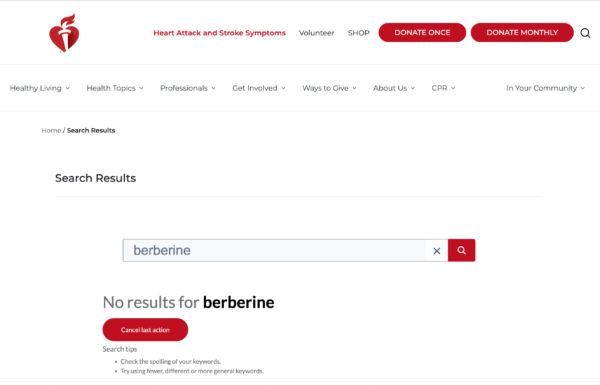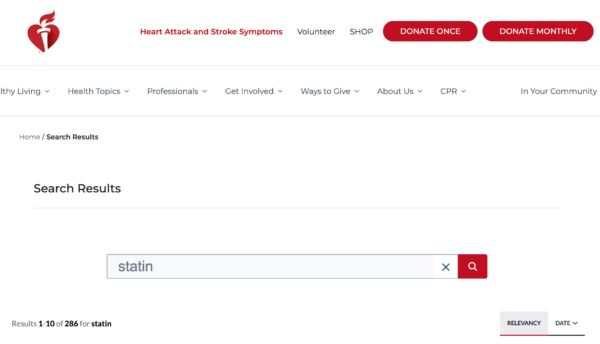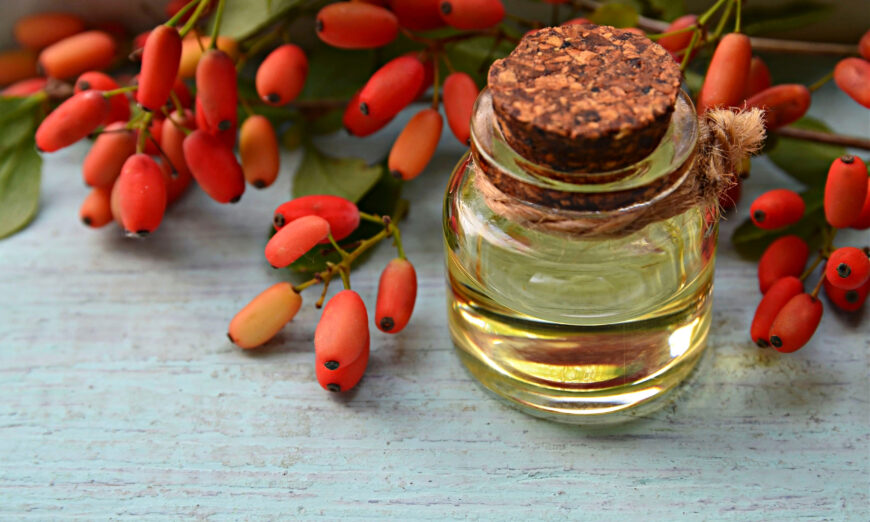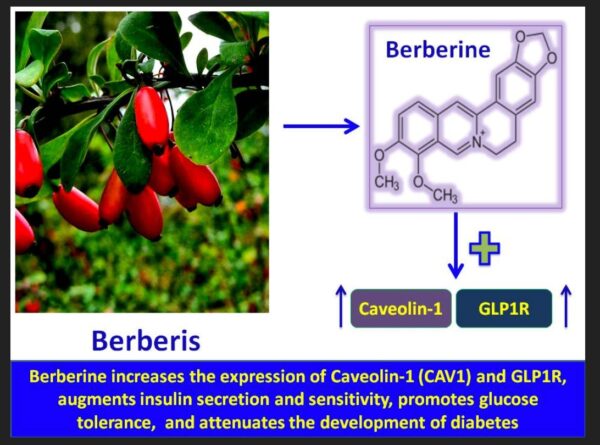This Journal features a nice writing on repurposed drugs, with a special focus on the health enhancing qualities of the nutraceutical berberine.
The article was written a year ago, on February 20, 2023, by Dr. Robert Malone, M.D., and is reposted here from his Substack.
Berberine: One of the Most Powerful Tools We Have to Regulate Insulin
Likewise, in the United States, “nutraceuticals” are largely unregulated, as they exist in the same category as dietary supplements and food additives by the FDA [U.S. Food and Drug Administration]. There is no way for a pharma company to make huge amounts of profits from repurposed drugs unless they can figure out a way to patent the product (formulations, co-administration with other agents, etc.). Even then, it can be very difficult and carries a lot of financial risk—in getting it through the patenting process (which is more difficult).
I spent a year discovering repurposed drugs for Zika in 2015–2016. This included using high-throughput screening to discover already licensed drugs and related compounds with strong antiviral properties (alone or in combination). Finally, we tested one product in a live animal model. This culminated in a lot of great in-vitro and in-vivo data.
The results showed that ivermectin and hydroxychloroquine were both excellent antivirals against Zika. Unfortunately, agencies within the U.S. government and private corporations have no interest in drug compounds that do not have a huge potential to make money. I could not get funding for any of this research (the DOD did supply a few resources, although not much, and NIH [National Institutes of Health] was downright passive-aggressive to the idea of testing repurposed drugs).
But silly me, I didn’t connect the dots that they had no interest in researching anything that was not driven by Big Pharma. Personally, I just could not imagine that the U.S. government was that corrupt. I just couldn’t understand why they didn’t have an active interest in pursuing repurposed drugs.
Jill and I funded the research out of pocket, and it just about bankrupted us. My conclusion at the time was that I will never do this again. I write all this because there is a pattern here. Then Zika passed into oblivion. The data got put on the shelf and time went by.
In writing this essay, I came across this old image of an invention disclosure I wrote in a notebook in 2016.

Hydroxychloroquine as an anti-viral, who knew?
Moving on.
One of the key examples used during Marik’s lecture at the Brownstone retreat was the compound berberine.
As berberine is derived from plants, it is considered a nutraceutical. As a consequence, there are few randomized clinical trials and little pharma or government interest in the drug. Probably because there is no profit motive at play here. Hence, most of us have never heard of it.
One of Marik’s main points was that berberine appears to be one of the most powerful tools we have to regulate insulin and yet because there is no profit in promoting this product, there is almost no publicity or significant research into its clinical benefits.
Traditional medicines use many plants that are true miracles provided to us by nature. Berberine is found in many plants throughout the world and has been used as an essential medicine globally for more than 3000 years. Traditionally, its uses have varied greatly and include treating infections and sores, and as an antimicrobial for various kinds of gastrointestinal inflammation.
Enzymes are proteins that function as biological catalysts in the body and act by accelerating chemical reactions. Berberine works by binding to a variety of individual enzymes and altering their efficiency.
What are the Health Benefits of Berberine?
(Note—there is no question that more research into this compound is needed. But there is overwhelming evidence that this drug has many health benefits and should not be overlooked when assessing the use of dietary nutraceutical supplements.)
Atherosclerosis

“Atherosclerosis is a chronic inflammatory disease of the arteries, and is the underlying cause of about 50% of all deaths in westernized society”
“Berberine is an extract of Chinese traditional herbs that is known for its antimicrobial and anti-inflammatory effects in the digestive system. Its underlying anti-CVD (cardiovascular disease) mechanisms are currently attracting interest, and its pharmacological actions, such as antioxidation, regulation of neurotransmitters and enzymes, and cholesterol-lowering effects, have been substantiated. Recent studying found that berberine could inhibit both the proliferation and apoptosis of VSMCs (vascular smooth muscle cells) induced by mechanical stretch stress simultaneously, which suggests that berberine might be an excellent drug to treat atherosclerosis.” Frontiers in Pharmacology, 2021
Blood Pressure
Berberine has been shown to help control blood pressure.
Blood Sugar Control (Insulin Regulation)
Berberine has been shown to significantly lower glucose levels in diabetic patients.
One study shows that berberine plus probiotics had the greatest effect on blood sugar levels, although berberine alone also was clinically significant in reducing blood glucose levels, whereas placebo and probiotics-alone control treatments were ineffective in these studies. It was noted that berberine induced more gastrointestinal side effects relative to the control groups.
Cholesterol
“Men randomized to berberine had larger reductions in total cholesterol (-0.39 mmol/L, 95% confidence interval (CI) -0.70 to -0.08) and high-density lipoprotein cholesterol (-0.07 mmol/L, 95% CI -0.13 to -0.01) after 12 weeks. Considering changes after 8 and 12 weeks together, berberine lowered total cholesterol and possibly low-density lipoprotein-cholesterol (LDL-c), and possibly increased testosterone.” Nutrients, 2021.
Taking berberine supplements regularly appears to lower total cholesterol, “bad” cholesterol, and triglycerides in people with high cholesterol. As it is not a statin and works through other pathways than statin drugs, it may be beneficial for people who wish to lower cholesterol but do not wish to take statins or are resistant to statins.
(The issue of statins is complex and not as clear-cut as many think. But this essay is not the place for that discussion. I promise though—at some point in time, we will get to that analysis).
Heart Disease
People with heart disease often have fatigue and irregular heartbeats. Studies show that taking berberine supplement combined with standard heart disease treatments reduces these symptoms. Berberine reduced the risk of death from heart disease without apparent side effects.
“One hundred fifty-six patients with CHF and >90 ventricular premature complexes (VPCs) and/or nonsustained ventricular tachycardia (VT) on 24-hour Holter monitoring were randomly divided into 2 groups. All patients were given conventional therapy for CHF, consisting of angiotensin-converting enzyme inhibitors, digoxin, diuretics, and nitrates. Patients in the treatment group (n = 79) were also given berberine 1.2 to 2.0 g/day. The remaining 77 patients were given placebo.” …
“After treatment with berberine, there was a significantly greater increase in LVEF, exercise capacity, improvement of the dyspnea-fatigue index, and a decrease of frequency and complexity of VPCs compared with the control group. There was a significant decrease in mortality in the berberine-treated patients during long-term follow-up … p <0.02).” AM J Cardiology, 2003
Note—this study was conducted in 2003, and yet only crickets have been heard from the American Heart Association concerning the benefits of berberine.
Here are the search results for “berberine” from the AHA website:

There are no results for “berberine” on the heart.org (AHA website)
Here are the search results for “statin” from the AHA website:

There are 286 results for “statin” on the heart.org (AHA website)
This is the state of Western medicine.
Neuroprotective Properties
There are many studies in rats and mice that show neuroprotective benefits of berberine.
One meta-analysis even concluded that berberine may be useful in the treatment of Alzheimer’s:
“Results: The included 15 articles met our inclusion criteria with different quality ranging from 3 to 5. We analyzed data extracted from full texts with regard to pharmacological effects and potential anti-Alzheimer’s properties. Our analysis revealed that in multiple memory defects animal models, berberine showed significant memory-improving activities with multiple mechanisms, such as anti-inflammation, anti-oxidative stress, cholinesterase (ChE) inhibition, and anti-amyloid effects.” BMC Complement Altern Med. 2019
Polycystic Ovary Syndrome (PCOS)
PCOS can cause high cholesterol, insulin resistance, and weight gain. Studies have shown that berberine helps women with PCOS to control their cholesterol, lower their waist-to-hip ratio, and increase their response to insulin. It also appears to increase.
“The effects of berberine on insulin resistance and abnormal glucose and lipid metabolism for restoring the reproductive health of women with PCOS are well recognized and have been widely studied, but much less attention has been given to its anti-inflammatory properties. Chronic low-grade inflammation is the unifying feature of PCOS and may contribute to reproductive disorders in PCOS. Berberine can modulate the inflammatory state of the ovaries and uterus in PCOS.” Current Medicinal Chemistry, Feb. 2023
Weight Loss
Berberine has been documented to help with weight loss.
One large meta-analysis study confirmed these results. In this study, several online medical databases were systematically searched to include in a meta-analysis to determine if berberine helped with weight loss. All clinical trials exploring the effects of berberine supplementation on indices of obesity were included. The results support the use of berberine supplementation for the improvement of obesity indices.
The Berberine compound is a quaternary ammonium salt from the protoberberine group of benzylisoquinoline alkaloids found in such plants as Amur cork tree, Californian poppy, European barberry, goldenseal, goldthread, Indian Barberry root, Oregon grape, Philodendron, prickly poppy, tree turmeric, and yellowroot. Generally, Berberine is usually found in the bark, rhizomes, roots, and stems.
Although considered safe to use, berberine can reduce the intended effect of some established therapies. Berberine weakly inhibits the CYP2D6 and CYP3A4 enzymes, which are pathways for metabolism of many prescription drugs.
Berberine is considered unsafe for use in newborns, infants, and children.
The Medline Plus page on berberine has an extensive list of drug interactions. Of interest is that the use of berberine may actually help reduce the amount of some medications needed, so titration of dosing is an important consideration and one that should probably be discussed with a health practitioner.
Please also note that berberine can affect other drugs, nutraceuticals, and supplements.
If you are experiencing side effects from any supplement or drug, discontinue and seek counsel from a health professional before resuming.
This article is not intended to treat or propose treatment—it is educational only. Please consult a health practitioner for healthcare.”
Crestone and Beyond
In my office is a poster with words from an unknown author which I found in the 1990s:
“Plants freely offer us more healthy associations than what all the chemists of the world could ever synthesize in a thousand years of effort. Not only are associations made from plants more varied than synthesized chemicals, but they are better tolerated by the body because they are the natural result of life chemistry.”
Prior to using ivermectin in the treatment of COVID-19, my experience with using repurposed drugs is limited to the use of low dose Dilantin as an antidepressant and using low dose naltrexone to assist with immune system modulation.
I discovered that the anticonvulsant Dilantin (phenytoin) can be used in lower dosing (~100 mg.) from reading an autobiographical account written by the financier Jack Dreyfus, entitled A Remarkable Medicine Has Been Overlooked. I recommended this low dose of Dilantin to select patients with good results. All of these patients were able to discontinue the Dilantin after a brief treatment course, and have remained in remission.
The use of low dose naltrexone is now a well established treatment modality to help modulate aberrant immune system function, as is seen in autoimmune disorders, of which there are now over 80 varieties known. Low dose LDN has also been used in cancer therapy, as well as for other disorders. You can learn more at ldnscience.org.
Dr. Malone references the use of hydroxychloroquine and ivermectin in the treatment of viral infections in order to call further attention to the fact that these drugs were successful in treating C-19. They are also very inexpensive, and are safe to use since side effects are unusual. He calls attention to the fact that the use of repurposed drugs is not in favor with the corporate interests of the pharma companies because it is not profitable. Do pharma companies care about what helps people be well?
Moving on to berberine.
This phytochemical has emerged as a helpful agent to improve all of the conditions which Dr. Paul Marik, M.D. lectured about in his Brownstone Institute presentation, which Dr. Malone summarizes in his Substack writing.
I have recommended berberine for the past 15 years, primarily to assist clients who have insulin resistance and Type II diabetes. In recommending berberine, the points made by Dr. Malone about berberine’s effects on liver metabolism of pharmaceuticals is important. He references a Medline Plus writing about Berberine’s effects on certain Phase I liver enzyme activity and subsequent drug metabolism and side effects.
The important enzymes to consider are CYP2D6 and CYP3A4. Berberine also affects CYP2C9, as the Medline article references. These 3 Phase I enzymes are responsible for preliminary metabolism of most pharmaceuticals. Anyone who has mutations in these enzymes, which are very common, will already have a somewhat sluggish, or downregulated, enzyme activity. Using berberine may further impede the enzyme activity, and this can become an important consideration for anyone taking the pharmaceuticals mentioned in the Medline article.
Good Berberine Supplements
Berberine has now been available as a supplement for years, and it has a good safety and efficacy profile. I have encountered a number of MD health practitioners who are recommending it for all of the reasons enumerated in Dr. Malone’s writing above.
My preferred supplement line, Designs for Health, has berberine available in a couple of formulations:
- Berberine-Evail… 400 mg. of the berberine plant alkaloid per capsule in an oil based encapsulation for optimal absorption and bioavailability.
- Berberine Synergy… 400 mg. of berberine combined with 100 mg. of alpha lipoic acid, as a powdered encapsulation to help support optimal blood sugar and insulin metabolism, cardiovascular health, and liver health.
The many health benefits of the berberine phytochemical makes it a worthy agent to be added to your supplement nutritional considerations.
Signing off from Crestone and Beyond
Associated Reading
- Berberine May Reduce Atherosclerosis, Promising Study Finds…this 7-2-23 article reports on a study published in Nature on 7-7-22…”the supplement berberine may prevent atherosclerosis, reducing the size of plaques in the carotid arteries. Berberine acts on harmful bacterial substances produced in the gut during digestion that can eventually enter the bloodstream and cause vascular inflammation, ultimately resulting in atherosclerosis.”
- Efficacy and Safety of Berberine Alone for Several Metabolic Disorders: A Systematic Review and Meta-Analysis of Randomized Clinical Trials…a 4-26-21 article published in Frontiers in Pharmacology concludes that “Berberine can improve obesity and hyperlipidemia by reducing TG, TC, and LDL and increasing HDL; reduce insulin resistance to improve type Ⅱ diabetes; and prevent diabetic encephalopathy…Berberine alone in patients with metabolic disorders can play a good therapeutic effect containing blood lipid-lowering, blood sugar-lowering, and insulin resistance amelioration, and the therapeutic effect becomes conspicuous with treatment time > 3 months. No clear direct evidence is found to prove the effects of age and the severity of the disease on drug efficacy, but evidence supports the use of berberine therapy in older people with metabolic disorders.”
- Berberine phospholipid exerts a positive effect on the glycemic profile of overweight subjects with impaired fasting glucose (IFG): a randomized double-blind placebo-controlled clinical trial…Results of a randomized clinical trial were recently published in the European Review for Medical and Pharmacological Sciences in July, 2023, detailing the effect of berberine on the metabolic profile of overweight participants with impaired fasting glucose (IFG). Forty-nine non-diabetic participants with a fasting glucose between 110 and 126 mg/dL and a mean BMI near 30 kg/m2 were randomized to receive either placebo or 550 mg berberine twice per day (before lunch and dinner), and assessed at baseline, 30 days, and 60 days. At 60 days, a significant decrease in fasting glucose was observed in the group receiving berberine compared to placebo. This study is consistent with many previous trials demonstrating the benefits of berberine supplementation for glycemic and metabolic control, including a meta-analysis of 46 randomized and controlled trials with diabetic participants, which found improvements in multiple parameters, including HbA1c, BMI, insulin sensitivity, and hyperlipidemia.
- The Experts Weigh In: Is Berberine Really ‘Nature’s Ozempic’?…a 9-3-23 article in The Chalkboard summarizing the nice benefits of berberine.
- Berberine’s Potential to Support Heart Health and Blood Sugar Metabolism…an April, 2023 summary of berberine’s benefits from CASI which is Clinical Applications of Scientific Innovation.
- This Is Not an April Fool’s Gag…posted here on 4-9-24 is an interview with preeminent virologist Dr. Geert Vanden Bossche who explains the need for ivermectin in treating the next wave of pandemic problems, especially in those who have been fully vaxxed for C-19 and will have Antibody Dependent Enhancement effects to contend with.

